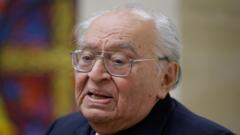Gustavo Gutiérrez, revered for establishing liberation theology, has died at 96 in Lima, Peru. His writings emphasized a divine commitment to the poor and called for a focus on earthly justice.
Remembering Gustavo Gutiérrez: Pioneer of Liberation Theology Passes Away at 96

Remembering Gustavo Gutiérrez: Pioneer of Liberation Theology Passes Away at 96
The influential Peruvian priest and theologian leaves a legacy of advocacy for the impoverished as he passes in Lima.
Gustavo Gutiérrez, the esteemed Peruvian priest and scholar who played a pivotal role in shaping Latin American liberation theology, passed away on Tuesday in Lima, Peru, at the age of 96. The news of his death, confirmed by the Dominican Order in Peru, marks the loss of a leading voice for social justice and compassion for the marginalized.
Father Gutiérrez was widely celebrated for his seminal work, “Teología de la Liberación,” published in 1971, which laid the groundwork for a theological framework centered on the plight of the impoverished. This pioneering text was made accessible in English in 1973 under the title “A Theology of Liberation,” and emphasized that the God of both Jewish and Christian traditions prioritized the poor.
His teachings were groundbreaking, as they proposed that salvation could be found not only in an afterlife but also through addressing and combating poverty and social injustice in the present world. Father Gutiérrez was adamant that understanding God required engagement with the struggles of the poor, urging the Church to care for the lives of individuals on Earth rather than focusing solely on the afterlife.
He astutely remarked that speaking of a "preferential option for the poor" was not about romanticizing poverty, but about confronting it as a systemic evil and actively working to eradicate it. His profound insights have inspired movements advocating for housing and healthcare as fundamental human rights, and his ideas continue to resonate in theological studies across seminaries and universities worldwide.
As we remember Father Gustavo Gutiérrez, we acknowledge his formidable impact on both religious thought and social action, a legacy that continues to inspire efforts towards justice and equality.
Father Gutiérrez was widely celebrated for his seminal work, “Teología de la Liberación,” published in 1971, which laid the groundwork for a theological framework centered on the plight of the impoverished. This pioneering text was made accessible in English in 1973 under the title “A Theology of Liberation,” and emphasized that the God of both Jewish and Christian traditions prioritized the poor.
His teachings were groundbreaking, as they proposed that salvation could be found not only in an afterlife but also through addressing and combating poverty and social injustice in the present world. Father Gutiérrez was adamant that understanding God required engagement with the struggles of the poor, urging the Church to care for the lives of individuals on Earth rather than focusing solely on the afterlife.
He astutely remarked that speaking of a "preferential option for the poor" was not about romanticizing poverty, but about confronting it as a systemic evil and actively working to eradicate it. His profound insights have inspired movements advocating for housing and healthcare as fundamental human rights, and his ideas continue to resonate in theological studies across seminaries and universities worldwide.
As we remember Father Gustavo Gutiérrez, we acknowledge his formidable impact on both religious thought and social action, a legacy that continues to inspire efforts towards justice and equality.




















